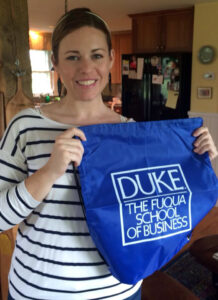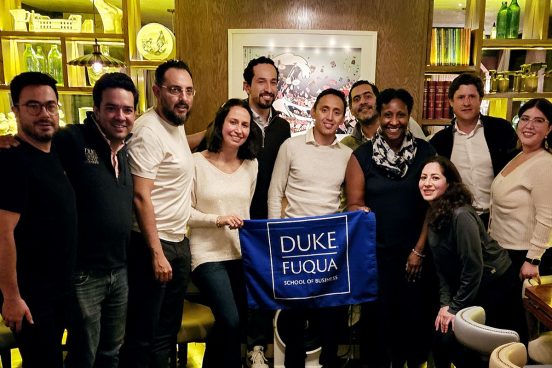Duke Daytime MBA Student Blog

So You’re on the Waitlist…

Editor’s note: Emily is the author of this post, and she’s awesome. But even awesome people can’t field dozens of questions from prospective students years after they’ve graduated. So, if you’re a waitlisted applicant with questions please review our admissions waitlist FAQs, and these tips from an admissions officer. If you would like to be connected to a current student who was accepted off the waitlist, please contact mbawaitlist@fuqua.duke.edu.
Ah, December: the most wonderful time of the year. Because of the holidays, right? You may be thinking that. No, I’m talking about that magical month when first-round applicants to MBA programs receive the news they’ve been waiting months for. If you’re like I was a year ago, all you want Santa to bring you is an acceptance from Fuqua, and the only visions dancing in your head are of Blue Devils and North Carolina BBQ. But Santa’s gift took a little while to get to me, because when I applied to Fuqua first-round last year, my response was: waitlisted. If you’ve found yourself in the same boat, read on for my personal advice on how to navigate the uncertain waters that lay ahead.
I applied to Fuqua while serving as a Peace Corps volunteer in Madagascar, and when I got my waitlist notification last December, I remember sitting in the sweltering office of my partner organization, using the last of my monthly internet credit to Google “Fuqua waitlist” and figure out what to do next. As I’m sure many of you have done, the first thing I read was an admissions officer’s blog post with his waitlist tips. He provided a great admissions office perspective on the matter, but I thought it would be helpful for those of you finding yourself waitlisted to hear from a current student who’s been through the same thing. (Spoiler alert: I got in!)
My advice for handling a waitlist situation:
Be Communicative

The number one thing you can do to help your candidacy is communicate to the admissions office that you are sincerely passionate about attending Fuqua. I can’t stress this point enough. Fuqua knows that most applicants apply to lots of different schools, and that a student whom they place on the waitlist will probably get an acceptance from another school. Even if a waitlisted applicant elects to remain on the waitlist, that applicant may have already accepted a spot at another school. Or maybe Fuqua was the only school they applied to during round 1, and they’re planning to apply to a host of other schools during round 2. For all they know, the applicant is only on the waitlist to see what happens, but isn’t really that interested in Fuqua. The bottom line is that the admissions team won’t know your level of dedication to attending Fuqua unless you tell them. Reach out and explain your commitment to getting accepted, and talk about why Fuqua specifically—what is it about our school that makes you want to be a part of it so much?
When I first got waitlisted, I just figured I would wait and see what happened. But then I emailed the second year student who conducted my Skype interview, and she gave me the above advice, which I then acted upon…and the rest is history.
Be Active
I’m no authority on the mysterious workings of the admissions committee or the decision-making process behind who gets accepted, denied, or waitlisted. However, my perspective is that being on the waitlist generally means they think you have potential as a Fuqua student, but there was something about your application, or about it in relation to the greater the applicant pool, that made them unable to extend you a full acceptance offer at that point in time. If you’re still passionate about attending Fuqua, your task now is to make yourself into an even more desirable candidate.
This is different for every applicant, but it may mean taking extra courses; conducting specific volunteer work; retaking the GMAT, GRE, or TOEFL; or sending an additional recommendation letter or two. In addition to communicating your desire to attend Fuqua, the committee probably likes to see you taking active steps to improve your candidacy. While they won’t explicitly tell you why you were waitlisted, most of us can generally guess where our application gaps are, and take steps to address that. In my case, I was an English major in undergrad and had never taken any business courses, so I knew I had academic shortcomings there. During application season, I had started taking an online microeconomics course, so part of my communication to the waitlist counselor was updates on how I did in the course. Additionally, I sent in two extra recommendation letters, and specifically asked these recommenders to address examples of how I embodied some of Fuqua’s core values.
Be Thoughtful
Although I gave the advice above to be an active communicator with the admissions office, it’s also crucial that you strike a balance between sincerely demonstrating your interest and being overly communicative to the point of turning them off. Be respectful of their time, and cognizant of the fact that they handle a LOT of communication. So don’t bombard them with needless emails or check-ins; limit your communication to specific events, actions, or materials. And remember that the admissions team will be evaluating any action or communication you make to assess whether or not they want you representing the Fuqua brand. I ended up talking with a member of the team after I started at Fuqua, and she told me that one criterion they have to consider is whether they’d feel comfortable having that applicant meeting with campus recruiters if they were a student. If an applicant exhibits behavior during the process that the admissions department considers impolite, they will likely worry that the he or she will exhibit the same behavior when they represent Fuqua at conferences and recruiting events.
Be Flexible
If you’re on the waitlist, and are sincerely committed to attending Fuqua, flexibility is key. If you get that call, can you pack up your life, move to Durham, and be prepared to start school in time? Waitlisted applicants are considered alongside all other applicants in subsequent rounds, and oftentimes into the summer after round 3 decisions have gone out. A classmate of mine received his waitlist call in July, just weeks before orientation, and had to turn on a dime to move to Durham from San Francisco while completing all the necessary pre-enrollment paperwork and requirements. If you’re waitlisted past the round 3 decision deadline, getting a spot might be a matter of an already-enrolled student deciding to defer, or changing their mind—in which case you might get a phone call and will have to make a very quick decision.
In my case, I received an acceptance during the round 3 notification window. I had begun to give up on Fuqua so I wasn’t holding my breath, and had even forgotten the actual date of the round 3 notification day. So imagine my surprise when, in the middle of a road trip to Boston, the admissions office called me with the good news. I had just returned home from the Peace Corps and had begun to make other plans, but my level of commitment to Fuqua was high enough that I spent a hectic few weeks changing those plans and preparing myself to move to Durham. One hurdle for me was completing the supplemental calculus course I had begun in just 2 short months. However, I’m a firm believer in taking on challenges so I put my nose to the grindstone and spent my summer buried in equations—and looking back at it 7 months later, I can verify that it was totally worth it.
The moral of my story is that being on the waitlist doesn’t mean that all is lost; in fact, it’s certainly much better than getting denied. By taking specific actions and working hard to prove yourself as a candidate, it’s entirely possible to turn that “waitlisted” status into “accepted.” I wish you all the best of luck, and I hope to see you here next year.



